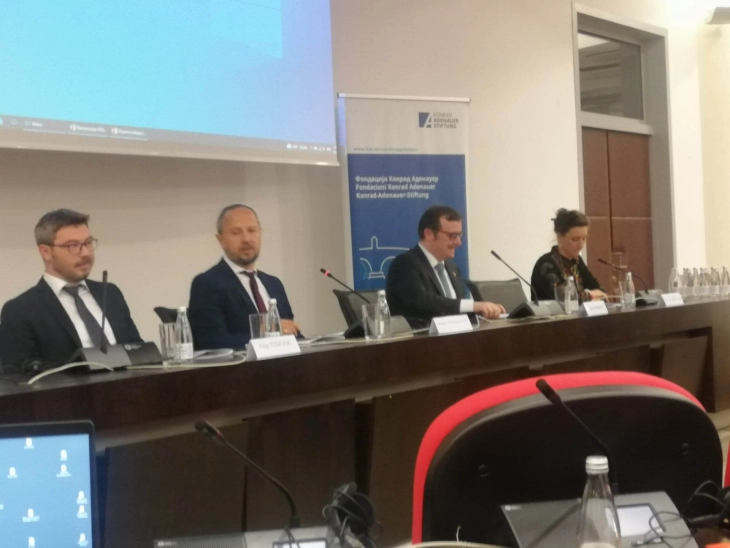Public opinion survey: Macedonian citizens' trust in EU at record low
- The level of trust that Macedonian citizens have in the EU is at a record low, shows a public opinion survey on the Macedonian process of EU accession, conducted by the Institute for Democracy Societas Civilis and the Konrad Adenauer Foundation.
- Post By Nevenka Nikolik
- 16:56, 1 March, 2023

Skopje, 1 March 2023 (MIA) – The level of trust that Macedonian citizens have in the EU is at a record low, shows a public opinion survey on the Macedonian process of EU accession, conducted by the Institute for Democracy Societas Civilis and the Konrad Adenauer Foundation.
“We’ve been following this for 7 years, and what we can conclude is that the support for joining the EU is at a record low, maintaining the bottom position with insignificant differences. That’s something that other research has concluded as well,” according to Marko Troshanovski, director of the Institute for Democracy.
He believes that a positive thing is that there is a significant improvement of the perception towards the Union as an influential identity and the country’s best ally.
“These things seem to be in contradiction, but we can conclude that it’s a key moment in which the EU has to take more practical steps to increase the level of readiness for the population to vote for a future potential entry to the EU, i.e., to increase support. We see the EU as better friends now. This is, of course, in context of the Ukrainian crisis etc., leaning towards those who are similar and who will protect you, but this positive level of perception towards the Union should be used to restore citizens' trust that this country has the perspective to become a member. That is the most interesting piece of information from this survey,” Troshanovski said.

He said that support for constitutional changes remains low, with 65% of the citizens being against, and 80% of ethnic Macedonians are against constitutional changes.
“Support for treating the Balkans as a singular region is exceedingly large, and the majority of people have been backing up these policies for quite some time,” he said.
The reasons for such results, Troshanovski says, don’t come from researching the reasons, but the disappointment comes from the fact that the process of negotiations hasn’t yielded results in years.
“Additionally, the process is more complicated with the new enlargement methodology that is far from operationalized, despite having been adopted two years ago, and it only contributes to defeatism and disappointment because it doesn’t lead to anything. Of course, the negotiating framework is a significant factor in European skepticism because it’s not based on pure Copenhagen criteria, imposing additional par excellence conditions for the country, and these are the two main reasons,” he said.
Daniel Braun, Director at the Konrad Adenauer Foundation in Skopje, said that this analysis is an excellent opportunity to analyze the results from previous research of the same kind, but he is regretful that the general opinion in the country is not improving, despite the fact that the factors for it are both external and internal.
“As director of the Konrad Adenauer Foundation, we are committed to see North Macedonia continue on its path to European integration, despite all external and internal influences. It’s evident that there is a loss of patience if an agreement is not achieved, maybe the European integration process would’ve accelerated, but we must point out that the structure of the member states and the EU works in a way which allows neighboring countries to make such demands. I cannot back such demands, a compromise would be the solution, and I believe the way to achieve that is to make the political elite unanimous,” Braun said.
He believes that Macedonian politics has many opportunities, economic benefits and security circumstances in favor, but it should be noted that the political structure in North Macedonia should be unanimous in terms of these issues.

Anamarija Velinovska from the European Integration Center at the Institute for Democracy said that the survey was conducted via two questionnaires this year. The first one was a survey that’s been monitored since 2014 in order to monitor trends with the citizensin terms of joining the EU.
“This year, 64% of citizens are in favor of EU membership if a referendum was to be held next week, which is 4% lower than in 2021. The second questionnaire relates to current political developments and how they distract the citizens. We mentioned the war in Ukraine this year, as a global political event, and the majority of citizens believe that negotiations are the solution for the war in Ukraine,” she said.
In terms of constitutional changes, Velinoska said that almost 2/3 of the citizens disagree with constitutional changes that would include the Bulgarian minority into the Constitution. MFA State Secretary Filip Tosevski said the EU accession process is one for all actors in the state, including all citizens, civil society, and this is where we see a key cooperation partner in these processes.
“We know there are many fluctuations lately in terms of public opinion regarding the perception of growing European skepticism, which is a consequence of some processes, but it’s important that we jointly discuss these topics and create appropriate communications and other kinds of strategies to correctly inform the citizens, and include them in these processes, because they revolve around the future of every citizen of the state,” Tosevski said.
He added that the Ministry will remain working with think tanks and NGOs in order to get bigger involvement for various actors in European processes. dk/nn/
Photo: MIA







